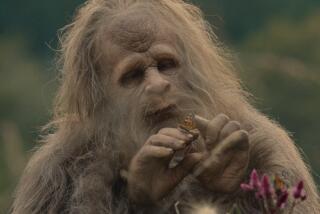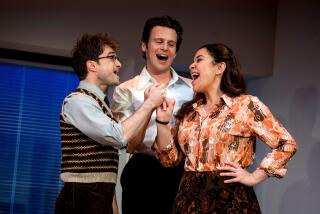Perspective: The imaginary cinematic sidekick
With his button eyes and potty mouth, not to mention his mean left hook, the teddy bear at the center of the hit comedy”Ted” is an unwholesome mess, but he’s also resourceful, tough and — let’s face it — magic. John, his “thunder buddy for life” and raison d’etre, is another story — an age-old story, at that.
The mild and clueless underachiever (played with perfect purposelessness by Mark Wahlberg) is the latest in a long line of characters: nebbishes who are put through some sort of test with the questionable guidance of imaginary or fantastical friends. It’s a setup built around their weakness. And, as usual, it’s definitely a guy thing.
Whether this is a bum rap or a reflection of reality, the fact is, long before Judd Apatow made lovable immaturity the default setting for leading men in comedies, male characters were already being cast in this particular, less-than-flattering light. In her introduction to the Grimm brothers’ version of the fairy tale “The Golden Bird” — in which a dim-bulb prince struggles to follow the instructions of a wise fox — scholar Maria Tatar notes that “if the female protagonists of fairy tales are often as good as they are beautiful, their male counterparts often appear to be as young and naïve as they are stupid.”
Two hundred years after the Grimms published their collection of folk tales, we’re in an era of “adultescence,” as New Yorker writer Elizabeth Kolbert calls the phenomenon of delayed emotional maturity — for males and females alike. But in movies and especially on TV, guys have long cornered the market on adultescence; “sitcom dad” is usually synonymous with “fool.”
Goofy man-child protagonists like Wahlberg’s John abound. What sets him and a few other chosen ones apart from the Apatovian masses is that their best friends are not quite human. Sometimes, as in the series “Wilfred,”the guy and his nonhuman pal have an ultra-exclusive relationship: Only Elijah Wood’s Ryan can communicate with the dog played by Jason Gann — echoes of “Mister Ed,” with the added ingredients of 21st-century angst, raunch and drugs. Wilfred is a party-hound canine and an unorthodox life coach to the troubled and wishy-washy Ryan. In his vulgarity-laced way, Wilfred is teaching the desperate-for-approval lawyer to stand up for himself.
Mainly, though, if Ted and Wilfred are channeling some sort of life force for their meek buddies, it’s not an animal vitality but a “guy spirit,” a kind of license for bad behavior and surface-level nonconformity. (“Wilfred,” not so coincidentally, was adapted from Australian TV by David Zuckerman, who worked with “Ted” director Seth MacFarlane on his animated sitcom “Family Guy,” on which the least foolish character is the upright talking dog Brian.)
Ted and Wilfred are both enablers, so to speak. Along with their run-of-the-mill misbehavior, they vent anger and satisfy appetites that the less-than-confident guys can’t begin to express. Their exaggerated bad-boy deeds are wish-fulfillment fantasies for the good boys. Not only does Ted skip the usual polite preliminaries when wooing a woman (and how) but also speaks to a prospective boss with obscene impudence and is rewarded for it (“That took guts. We need guts.”).
The raunch factor is nothing if not a sign of the times. The granddaddy of the interspecies buddy comedy, 1950’s “Harvey,”is by contrast an ode to genteel eccentricity. Harvey himself, never seen except in a painting, is a 6-foot, 31/2 -inch rabbit — a mysterious pooka, from Celtic mythology — who’s the constant companion of an oddball tippler named Elwood P. Dowd, played by Jimmy Stewart in one of his most famous roles.
Like “Ted” and “Wilfred,” “Harvey” tussles with notions of rehabilitation and domestication. But notwithstanding its sentimentality, the comedy of errors is far more open-ended — and open-minded — than the newer stories. “I’ve wrestled with reality for 35 years, Doctor,” Stewart’s Elwood says with assurance. “And I’m happy to state I’ve finally won out over it.” No such outcome would be acceptable for John or Ryan; their goal, however roundabout the pursuit, is to be part of the fold.
In “Harvey,” there’s a clear dividing line between Elwood’s life of martinis and conviviality and the sanatorium where Serum 977 can shock him back to dull normality: an electric gate used with comic emphasis. In contemporary stories, there’s no easy demarcation. Therapy seeps into everyday life, and everyone’s working on self-improvement, even adorably reluctant schlubs and wimps who share bong hits with talking animals. It’s clear too that the pooka’s power has diminished over the decades. He may still be otherworldly, but he’s just another slob.
In today’s sidekick capers, the stuck-in-neutral guys play straight man to their unlikely buddies, and they occupy the lesser role in the bizarro symbiosis. They’re passive heroes. The action front these days belongs to a couple of female characters who, like their fairy-tale ancestors, are confronting beastly types in fearless, soul-defining showdowns: a princess named Merida and a little girl named Hushpuppy.
Linden in a film critic in Los Angeles.
More to Read
Only good movies
Get the Indie Focus newsletter, Mark Olsen's weekly guide to the world of cinema.
You may occasionally receive promotional content from the Los Angeles Times.






